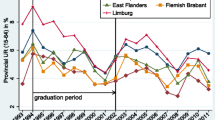Abstract
It is well known that young cohorts experience higher unemployment rates than their adult counterparts. However, it is less well known that more educated young cohorts may face higher unemployment rates than less educated ones. This seems to be the evidence in some OECD countries such as Spain and Italy. We use data on the Spanish labour market and estimate a duration model for young unemployed people. University graduates’ lack of job experience may explain this puzzling observation.
Similar content being viewed by others
References
Ahn N, Ugidos A (1996) The effects of the labour market situation of parents on children inheritance of unemployment. Investigaciones Econ 20(1):23–41
Alba-Ramirez A, Freeman R (1990) Jobfinding and wages when longrun unemployment is really long: the case of Spain. Working paper 3409, NBER
Alba-Ramirez A (1998) Re-employment transitions of young workers in Spain. Investigaciones Econ 22(2):201–224
Albert C, Juarez JP, Sánchez R, Toharia L (2000) La transición de la escuela al mercado de trabajo en España: años noventa. Pap Econ Española 86:42–58
Allison PD (1982) Discrete-time methods for the analysis of event histories. In: Leinhardt S (eds) Sociological Methodology. Tossey-Bass, San Francisco, pp 61–98
Becker GS (1975) Human capital, a theoretical and empirical analysis with special reference to education. Columbia Unviersity Press
Bote V (2002) Sorting, job contacts and inequality. Tesina no. 0206, CEMFI.
Bover O, Arellano M, Bentolila S (2002) Unemployment duration, benefit duration, and the business cycle. Econ J 112:223–265
Calero J, Madrigal M (2002) Trampa del desempleo y educacion: un análisis de las relaciones entre los efectos desincentivadores de las prestaciones en el Estado de bienestar y la educación. Working Paper Fundación BBVA. September
Congregado E, García JI (2002) El problema del desempleo en la economía andaluza (1990–2001): análisis de la transición desde la educación al mercado laboral. centrA working paper 2002/17.
Davia MA, Smith M (2001) Youth labour markets in spain and UK different systems: different outcomes? IV J Econ Laboral, Valencia
Dolado JJ, Felgueroso F, Jimeno JF (2000) Explaining youth labor market problems in Spain: crowding-out, institutions, or technology shifts?. Eur Econ Rev 44:943–958
Dolado JJ, Jansen M, Jimeno JF (2002) A matching model of crowding-out and on-the-job search (with an application to Spain). Working Paper 2002-16, FEDEA
EPA (2000) Descripción de la encuesta, definiciones e instrucciones para la cumplimentación del cuestionario. INE
Francesconi M, Ermish J (2000) The effect of parents’ employment on children’s educational attainment. Discussion Paper 215, IZA
Gangl M (2000) Education and labor market entry across Europe: The impact of institutional arrangements in training systems and labour markets. Working paper 25, MZES.
García-Montalvo J, (2000) Formación y empleo de los graduados de enseñanza superior en España y en Europa. Fundacion Bancaja, Valencia
García-Montalvo J, Peiró JM (1999) El mercado laboral de los jóvenes: formación, transción y empleo. Fundación Bancaja-IVIE, Valencia
García-Montalvo J, Periró JM, Soro A (2003) Observatorio de la Inserción Laboral de los Jóvenes: 1996–2002. Fundación Bancaja-IVIE, Valencia
García-Pérez JI (1997) La tasa de salida del empleo y el desempleo en España (1978–1993). Investigaciones Econ 21:29–53
García-Serrano C, Jenkins SP (2000) Re-employment probabilities for Spanish men: what role does the unemployment benefit system play? Working paper 2000-17, ISER
Jenkins SP (1995) Easy estimation methods for discrete-time duration models. Oxford Bull Econ Statist 57(1):129–39
Jenkins SP (1997) sbe17: Discrete time proportional hazard regression. Stata Tech Bull 39:22–32
Lassibille G, Navarro L, Aguilar I, O Sanchez C (2001) Youth transition from school to work in spain. Econ Educ Rev 20(2):139–149
Lancaster T (1979) Econometric methods for the duration of unemployment. Econometrica 47(4):939–956
Martin Serrano M, Velarde Hermida O (2000) Juventud en España, Injuve
Mortensen DT (1985) Job search and labour market analysis. In: Ashenfelter OC, Layard R (eds) Handbook of labour economics, vol 2. North Holland, pp 849–919
Narendranathan W, Elias P (1993) Influences of past history n the incidence of youth unemployment: Empirical findings for the UK. Oxford Bull Econ Statist 55(2):161–185
Narendranathan W, Stewart M (1993) How does the benefit effect vary as unemployment spells lengthen? J Appl Econometrics 8:361–381
Nickell S (1979a) Estimating the probability of leaving unemployment. Econometrica 47(5): 1249–1266
Nickell S (1979b) The effect of unemployment and related benefits on the duration of unemployment. Econ J 89:34–49
OECD (2000) From initial education to working life.
OECD (1997) Education at a glance.
Prentice RL, Gloeckler LA (1978) Regression analysis of groupes survival data with application to breast cancer data. Biometrics 34:57–67
Soro-Bonmatí A, Ianelli C (2001) School-to-work transitions in Italy and Spain: similar outcomes, different pathways? IV Jornadas de Economía Laboral, Valencia
Author information
Authors and Affiliations
Corresponding author
Rights and permissions
About this article
Cite this article
Fernández, C. The Role of Education vis-a-vis Job Experience in Explaining the Transitions to Employment in the Spanish Youth Labour Market. SpanEconRev 8, 161–187 (2006). https://doi.org/10.1007/s10108-006-9001-3
Published:
Issue Date:
DOI: https://doi.org/10.1007/s10108-006-9001-3



